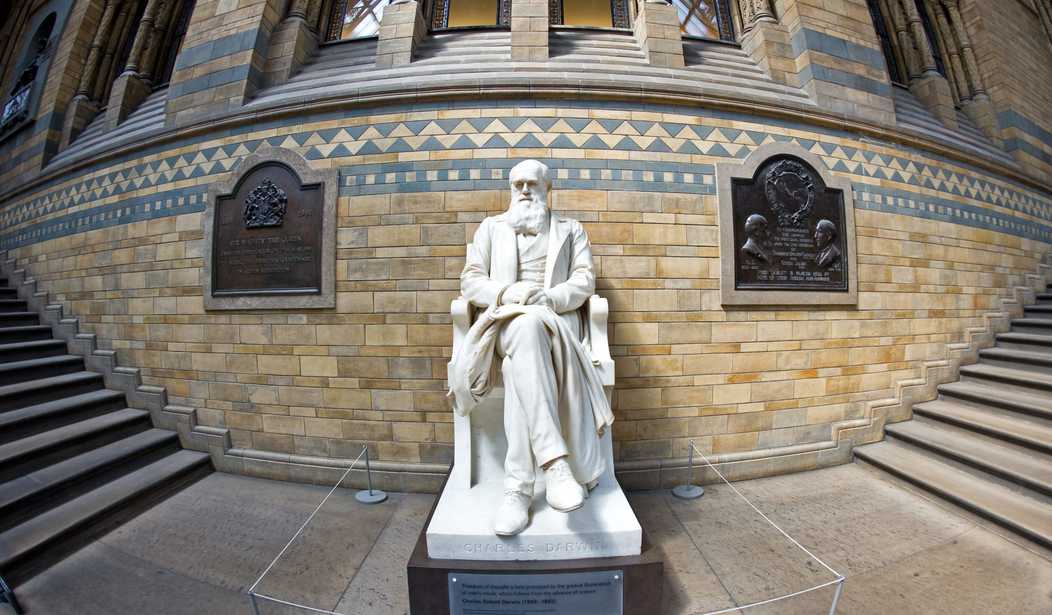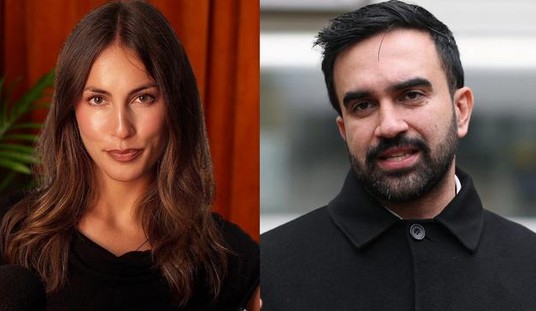Charles Darwin was born on February 12, 1809, and many celebrate his birthday on Sunday, known as “International Darwin Day.” But what was Darwin’s real legacy? Most Christians view him negatively, while a few defend him.
“The legacy of popularized Darwinism is a fatal philosophical disaster on every level,” Daniel J. Phillips, pastor of Copperfield Bible Church in Houston, TX, and author of The World-Tilting Gospel: Embracing a Biblical Worldview and Holding on Tight, told PJ Media in an email statement. “As I explained elsewhere in PJ Media, any starting-place other than the truth of God as He speaks in Scripture is sure to bear poisonous fruit.”
Phillips was scathing in his critique of the philosophy based on Darwin’s theory of evolution: “In Darwinism’s case the direct line traces to moral relativism, racism, nihilism, violent oppression, and a complete misreading of the nature and significance of humanity.” Phillips concluded by declaring, “Our only hope lies in Jesus Christ, and popularized Darwinism points inexorably in the opposite direction.”
Few Christians may be quite as blistering in their criticism of Darwin as Phillips, but his negative opinion of Darwin’s legacy is echoed in many corners of the church. Other critics expounded on Darwin’s legacy in three specific areas: science, religion, and society. These Christians argued that Darwin’s legacy stands in the way of genuine science, it presents an alternative to God, and it inspired some of the worst evils in human history.
I will present these three arguments, and the response of a Christian who defended Darwin as a great scientist who discovered a great deal of truth, but who has been twisted to fit many different (and quite negative) ideologies.
1. Darwin’s legacy is anti-science.
“Darwin’s theory has fueled fanaticism and intolerance in the name of science that is antithetical to genuine science,” John West, senior fellow at the Discovery Institute and author of The Magician’s Twin: C. S. Lewis on Science, Scientism, and Society, told PJ Media in an email statement. West characterized Darwin’s legacy in the field of science as mostly “a dead end.”
“Accidental mutations don’t produce new animals. They degrade existing organisms,” West declared. “The bottom line is that Darwin’s unguided mechanism is incapable of producing the large-scale changes he was purporting to explain.” West pointed to the late National Academy of Sciences Member Phil Skell’s article in The Scientist, which argued that most of the major scientific discoveries during the past century owe little or nothing to Darwin’s theory.
West pointed to two examples of human biology where Darwin’s theory has gone awry: the appendix, long considered a useless “vestigial” organ which scientists recently discovered to be important; and “junk” DNA in the human genome, which does not code for any protein but also fulfills vital functions.
But it gets worse. “Darwin’s theory was so infused with ideological zeal from the very beginning that it has hurt genuine scientific inquiry by turning the discussion over origins into more of an ideological litmus test than an open-minded search for the truth,” West argued. In this way, “Darwin’s theory has also served as a science-stopper.”
Dr. Fazale Rana, vice president of research and apologetics at Reasons to Believe, hailed Darwin as, in many ways, “the consummate scientist.” He emphasized that Darwin’s “ideas have become the organizing principle in biology — biology’s Grand Unifying Theory, if you will.”
Nevertheless, even in science, Rana argued that Darwin’s legacy is “a mixed bag.” Evolution, “even though it is the central principle in biology, often shuts down certain avenues of scientific inquiry and limits science in its pursuit of truth by prohibiting any approach to the question of origins that involves intelligent design.”
Rana argued that “the evolutionary paradigm struggles to explain the origin of life or events in life’s history, such as the Cambrian explosion.” But “these events find ready explanation from a creation model vantage point.”
2. Darwin’s legacy is anti-God.
“Although atheism might have been logically tenable before Darwin, Darwin made it possible to be an intellectually fulfilled atheist,” wrote the infamous evolutionary biologist and “new atheist” Richard Dawkins in his book The Blind Watchmaker: Why the Evidence of Evolution Reveals a Universe without Design.
Fazale Rana, the Reasons to Believe vice president and co-author of Who Was Adam? A Creation Model Approach to the Origin of Humanity, mentioned this quote, and argued that “Darwin’s theory undermines the biblical view that human beings are exceptional, made in God’s image.”
Rana pointed out that Alfred Russel Wallace, a contemporary of Darwin hailed as the co-founder of modern evolutionary theory, independently discovered natural selection, but he “was not willing to have natural selection replace God’s role as creator.”
“Darwin on the other hand was motivated toward that end, for metaphysical reasons, not scientific ones,” Rana argued. “He viewed his theory as a theodicy — a solution to the problem of evil. But for that solution to gain hold, he had to demonstrate that natural selection could explain design in biology — features that many pointed to as evidence for a Creator’s role in the origin, history, and design of life.”
West, the Discovery Institute fellow, agreed with Dawkins and Rana about the practical impact of Darwin’s theory. “Darwin argued that natural selection explained how we could get the appearance of purpose in nature through a blind, unguided process,” West explained. “This wrong-headed idea inspired generations of thinkers to argue that science had somehow disproved God.”
West cited a 2016 poll commissioned by the Discovery Institute which found that nearly 7 in 10 atheists and more than 4 in 10 agnostics “say that for them personally, unguided chemical evolution and Darwin’s mutation/natural selection mechanism have made the existence of God ‘less likely.'”
“Darwin’s unique contribution was to argue that the mechanism driving the history of life is a blind, unguided process. Darwin’s core idea was that the appearance of design and purpose in nature can be explained away as the product of an impersonal materialistic process,” West wrote.
Tim Foutz, Ratio Christi chapter director at the University of Washington, argued that Darwin’s theory allowed science to overstep its bounds. “Religion/faith is a worldview and science is a methodology,” Foutz explained. “Today science is a methodology that desperately wants to be a worldview. We call this scientism, and I think Darwin opened that door.”
Foutz argued that Christians who attempt to accept Darwinian evolution fall into a trap which eventually destroys Christian theology. He quoted Darwin’s Christian friend, Asa Grey, who said, “Darwinism is opposed, not to Theism, but only to Intervention in Nature.”
“From that perspective, Christianity and science are compatible, but the cost for that compatibility is pretty high in terms of biblical theology,” Foutz said. He argued that a non-interventionist view of God rules out the Incarnation, and it means that “Adam and Eve can no longer be seen as historical people, and that rules out Original Sin.”
3. Darwin’s legacy is anti-compassion.
West, the Discovery Institute scholar, argued that “only someone who has never read Darwin’s works could seriously maintain that there is no connection between Darwin and social Darwinism.” Social Darwinism has a deservedly bad reputation for applying Darwin’s theory of survival of the fittest to human society.
“In his book The Descent of Man, Darwin attacked human uniqueness as well as offering a relativized version of morality based on natural selection,” West explained. “He further expressed his fear that civilized nations were destroying the human race by vaccinating people against smallpox, by helping the poor, and by treating the sick.”
Yes, Darwin attacked the very idea of compassion. “He warned that this kind of humanitarianism helped preserve weak and defective humans that natural selection would have killed off,” West explained. By helping the weak continue to survive, humans were stalling evolution.
Foutz, of Ratio Christi, argued that Darwin was the effect, not the cause, of social Darwinism. “I think a case could be made that Darwinian ideals influenced Nietzsche, who influenced Hitler,” he said. “But I think the result is less a direct chain of events than a constellation of factors.”
Indeed, Richard Weikart, a history professor at California State University-Stanislaus and author of Hitler’s Religion: The Twisted Beliefs That Drove the Third Reich, told PJ Media that Adolf Hitler was a Darwinistic pantheist. The Nazi dictator’s commitment to exterminate the weak from humanity was arguably rooted in social Darwinism.
Edward B. Davis, a professor of the history of science at Messiah College and regular blog contributor at the evolutionistic theist BioLogos Foundation, defended Darwin’s influence, but admitted that “Marxists, Nazis, and free market capitalists have all claimed to be putting Darwin into practice.”
“Darwin himself took ideas from British political economy and read them into nature,” Davis added. “His emphasis on competition among organisms was directly inspired by Thomas Malthus’ analysis of human competition for scarce resources. His belief that unguided competition enriches the economy of nature by producing diversity and specialization mirrored Adam Smith’s conviction that the invisible, unguided hand of the free market enriches the economy of man in similar ways.”
Rana, the Reasons to Believe vice president, agreed that “social Darwinism is a consequence of Darwin’s theory — it is a logical entailment.”
“As an extension, many of Darwin’s adherents see his legacy as going beyond science, revealing a lack of purpose to life’s history and human existence, demoting humans to merely another animal and an insignificant part of life’s history,” Rana concluded.
4. A defense of Charles Darwin.
Despite the link between Darwin’s theory and social Darwinism, most sources admitted that, in the words of John West, “Darwin was a kindly man, and he likely would have been horrified at some of the things done in his name.”
Davis, the blogger with BioLogos, went much further, defending Darwin as a consummate scientist as well. “Charles Darwin was undoubtedly one of the greatest scientists of the nineteenth century,” Davis wrote. “A meticulous, perceptive student of the natural world, he found crucial clues about the history of nature in seemingly trivial details and explained a very large number of diverse observations with a single, simple theory of common ancestry.”
“Whether or not Darwin was right about every detail, the overall picture rings true,” Davis argued. “Evolution by natural selection is testable — the ability of bacteria to develop resistance to specific antibodies, here and now, is just one easily understood example.” He also claimed that detailed knowledge of the human genome and of other organisms provides “clear, unambiguous evidence that humans and chimpanzees had a common ancestor at some point in the past.”
Davis also claimed that “even the strictest creationists appeal to Darwin’s theory to account for changes in animal types that must (in their view) have taken place on a large scale, with great rapidity, since the biblical flood.”
Other Christians might counter that this microevolution is different from macroevolution on the species-to-species level. Even so, a theory of evolution can be reconciled with Christianity, though a full Darwinism may well rule out the Incarnation, as Foutz argued.
Despite the negative influences of Darwin’s legacy, the man himself was a great scientist and it is undeniable he left a huge mark on the world, for good or ill. But without the Holy Spirit, Darwin may have unwittingly allowed that powerful impact to be twisted in horrendous ways he could never have imagined.









Join the conversation as a VIP Member